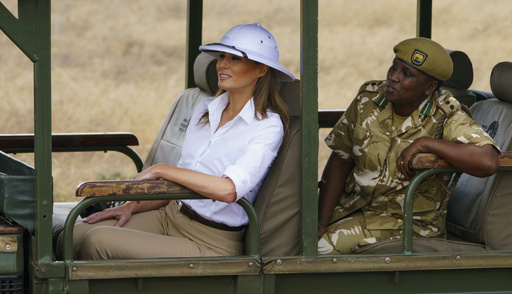
ABUJA, Nigeria — Following Donald Trump’s election victory, African leaders expressed optimism about enhancing ties with the United States, but many doubt that substantial changes will arise for the continent, which is home to over 1.4 billion individuals.
After Trump’s win, William Ruto, Kenya’s president, indicated that Kenya is enthusiastic about strengthening its relationship with Washington. Similarly, Bola Tinubu from Nigeria spoke about a potential second Trump term fostering a period of “earnest, beneficial, and reciprocal” collaboration.
Nevertheless, analysts suggest that Africa, previously labeled as “shithole countries” by Trump, will likely remain low on his agenda.
The emphasis on Africa within U.S. foreign policy has historically been minimal—often viewed primarily through the lens of countering adversaries like Russia and China. Charles Ray, who led the Africa Program at the Foreign Policy Research Institute, pointed out that President Joe Biden positioned Africa as a crucial partner, but tangible progress was sparse following those commitments.
Ray predicts that Trump will prioritize Africa even less, reiterating that any U.S. engagement on the continent will likely stem from his “transactional” leadership style.
Many experts recognize that Trump’s “America First” approach signals a withdrawal from global commitments. Murithi Mutiga, who oversees the African program at the Crisis Group, characterized Trump as someone inclined toward isolationism, signifying his preference for reducing international involvement.
However, some believe there are opportunities for beneficial agreements, even within Africa. J. Peter Pham, who served as Trump’s special envoy for Africa, suggested that a new Trump administration might seek mutually advantageous arrangements on the continent, possibly including a renewal of the African Growth and Opportunity Act, which facilitates duty-free trade for eligible African nations.
Yet, U.S. legislators have raised concerns regarding the compliance of African countries with the program’s stipulations and their alignment with U.S. foreign policy aims. Notably, South Africa, a significant participant in this program, faced accusations from U.S. Ambassador Reuben Brigety of supplying arms to Russia, further complicating its standing with the U.S.
Pham emphasized that countries that challenge U.S. interests will face consequences, as any such actions could label them as “pariahs.”
The upcoming Trump presidency raises fears about potential funding cuts, particularly in programs that support reproductive health for countless girls and young women in Africa. Valentine Damitoni, an 18-year-old mother from Zimbabwe, highlighted the grim situation many face without access to U.S.-funded contraceptive services, which allow her to continue her education.
Max Primorac, a former acting deputy administrator of the U.S. Agency for International Development, criticized various programs within Project 2025, a conservative blueprint aligned closely with Trump’s goals, particularly for what he deems adverse initiatives like those promoting abortion and certain social policies.
In Africa’s increasingly tumultuous Sahel region, anti-Western sentiments have escalated, leading to coups and the severing of ties with traditional allies like the United States and France, as nations look towards Russia. China, which promotes infrastructure loans as mutually beneficial, generally steers clear of meddling in the political affairs of recipient countries, while Russia has become a significant supplier of arms to Africa’s military factions.
Mutiga expressed that the West has historically framed Africa as a problem to be addressed, while other nations view it as an opportunity to leverage.
With the Biden administration having pledged substantial investments in Africa, worries persist about Trump’s potential cutbacks in foreign aid and how this could affect ongoing health and development endeavors at a time when challenges such as hunger and democratic backsliding are becoming more pronounced. For many Africans, Trump remains an abstraction with little relevance to their immediate issues.
Isah Mohammed, a fruit vendor in Nigeria’s capital, remarked, “Trump is not going to save us from hunger caused by our government.”
In Morocco, excitement bloomed after Trump’s electoral win, with hopes that his leadership might bolster international recognition of the country’s claims over Western Sahara, a disputed territory. The Assabah newspaper referred to his return to office as welcomed by Morocco, which had received acknowledgment of its sovereignty claims as part of a broader agreement.
Tensions between Somalia and Ethiopia, compounded by the ongoing war in Sudan, threaten stability in the Horn of Africa, with predictions that Trump might divert attention towards Somaliland over Somalia.
The G20’s recent decision to welcome the African Union as a permanent member underscored the continent’s significance. Yet analysts noted that this acknowledgment has not been matched by cohesive and effective representation of Africa’s interests in international dialogue.
Mutiga emphasized that the focus should not solely be on U.S. actions but also on how Africa articulates its own priorities, especially in a global landscape driven by transactional relations.
In summary, unless African leaders effectively communicate their interests, U.S. engagement will likely continue to be influenced by its geopolitical rivalries.
